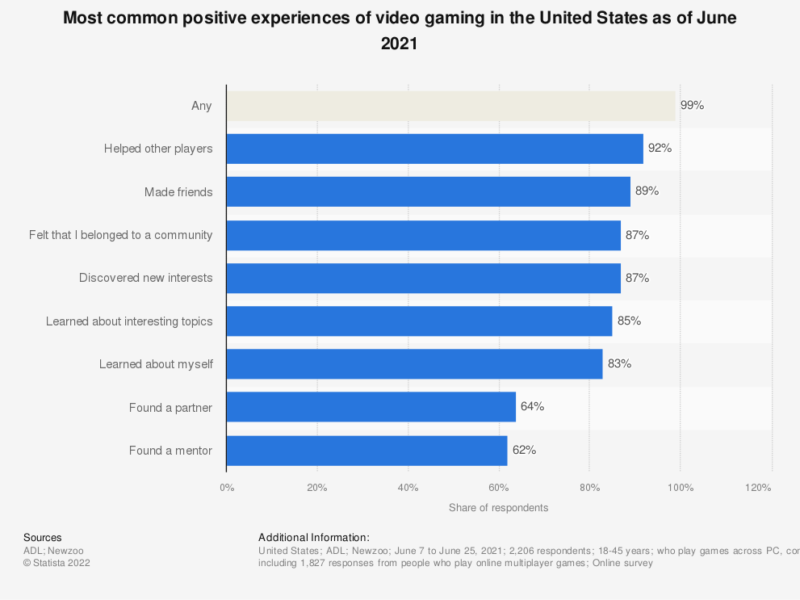Introduction
Overview of online gaming
Online gaming has become a popular form of entertainment for people of all ages. With the advancement of technology, online gaming has evolved into a multi-billion dollar industry. The convenience of playing games from the comfort of one’s own home, along with the ability to connect with players from all over the world, has made online gaming a preferred choice for many. The industry is constantly evolving, with new games and technologies being introduced regularly. In this article, we will explore the latest trends in online gaming and what the future holds for this exciting industry.
Importance of understanding trends
Understanding trends in online gaming is crucial for both players and developers. For players, it allows them to stay up-to-date with the latest games, features, and technologies, ensuring they have the best possible gaming experience. For developers, understanding trends can help them create games that are more engaging, immersive, and profitable. By keeping an eye on emerging trends, developers can identify new opportunities and stay ahead of the competition. Ultimately, understanding trends is essential for anyone who wants to succeed in the fast-paced and constantly evolving world of online gaming.
Trends in Online Gaming
Mobile gaming
Mobile gaming has been on the rise for the past few years and it is expected to continue its growth in the future. With the increasing popularity of smartphones and tablets, more and more people are turning to mobile gaming as a way to pass the time. The convenience of being able to play games on the go has made mobile gaming a favorite among gamers of all ages. In addition, the development of mobile technology has allowed for more advanced games to be created, which has further increased the appeal of mobile gaming. As a result, we can expect to see more mobile games being developed and released in the future, with even more advanced features and graphics.
Virtual reality
Virtual reality (VR) is one of the most exciting trends in online gaming. With the development of VR technology, players can now immerse themselves in a completely different world and experience gaming like never before. VR headsets like the Oculus Rift and HTC Vive have already made a significant impact in the gaming industry, and we can expect to see more advancements in this area in the future. As VR becomes more accessible and affordable, we can expect to see a rise in the number of VR games and experiences available to players. The potential for VR in online gaming is enormous, and it’s definitely a trend to watch out for in the coming years.
Cloud gaming
Cloud gaming is a relatively new concept that has been gaining popularity in recent years. It involves streaming games over the internet, rather than downloading them onto a device. This means that players can access a vast library of games without needing to invest in expensive hardware. Cloud gaming also allows for seamless cross-platform play, as players can switch between devices without losing their progress. As internet speeds continue to improve, we can expect to see more and more games being offered through cloud gaming platforms. However, there are still some concerns around latency and internet connectivity, which may need to be addressed before cloud gaming becomes the norm.
Cross-platform gaming
Cross-platform gaming is becoming increasingly popular among gamers. This trend allows players to play games on different devices, such as consoles, PCs, and mobile devices, while still being able to play with friends who are using different devices. This is a great way to bring gamers together and create a more inclusive gaming community. With the rise of cloud gaming services, cross-platform gaming is set to become even more prevalent in the future. This will allow gamers to access their favorite games from any device, anywhere in the world. As technology continues to advance, cross-platform gaming is sure to become an even more integral part of the online gaming experience.
Social gaming
Social gaming has become increasingly popular in recent years, and it is expected to continue to grow in the future. This type of gaming involves playing games with friends or other players online, often through social media platforms. Social gaming provides a sense of community and allows players to connect with others who share similar interests. In addition, social gaming often incorporates elements of gamification, such as rewards and achievements, which can make the experience more engaging and enjoyable. As social media platforms continue to evolve and new technologies emerge, the possibilities for social gaming are endless.
E-sports
E-sports, or competitive video gaming, has exploded in popularity in recent years and is expected to continue to grow in the future. Major tournaments and leagues are now being broadcast on television and online platforms, attracting millions of viewers and offering substantial prize pools. As e-sports continues to gain mainstream recognition, more and more professional players are emerging, and the industry is becoming increasingly lucrative. In addition, the rise of virtual reality technology is expected to revolutionize the e-sports experience, allowing players and spectators to immerse themselves in the game like never before.
Impact of Technology on Online Gaming
Advancements in graphics and processing power
Advancements in graphics and processing power have been a driving force behind the evolution of online gaming. With the introduction of new technologies such as virtual reality and augmented reality, game developers are now able to create more immersive and realistic gaming experiences. The use of high-end graphics cards and powerful processors has also enabled games to run smoother and faster, allowing for more complex gameplay and larger multiplayer matches. As technology continues to advance, we can expect to see even more impressive graphics and processing power in the future of online gaming.
Artificial intelligence and machine learning
Artificial intelligence (AI) and machine learning are rapidly transforming the online gaming industry. With AI, game developers can create more realistic and challenging opponents for players, as well as personalized gaming experiences. Machine learning algorithms can analyze player behavior and preferences, allowing for targeted marketing and game recommendations. Additionally, AI-powered chatbots can provide instant customer support, enhancing the overall gaming experience. As AI and machine learning continue to advance, we can expect to see even more innovative and immersive gaming experiences in the future.
Blockchain technology
Blockchain technology is set to revolutionize the online gaming industry. With its decentralized and secure nature, blockchain can provide a transparent and fair gaming experience for players. It can also eliminate the need for intermediaries, such as payment processors, and reduce transaction fees. Moreover, blockchain can enable players to truly own their in-game assets, which can be traded or sold outside of the game. This opens up new opportunities for players to earn real money from their gaming activities. As blockchain technology continues to evolve, we can expect to see more online gaming platforms adopting it to enhance their offerings and attract more players.
Challenges and Opportunities
Monetization strategies
Monetization strategies are crucial for the success of online gaming companies. One trend that has emerged in recent years is the use of in-game purchases. This allows players to buy virtual goods or currency with real money, which can enhance their gaming experience. Another popular strategy is the use of subscription models, where players pay a monthly fee for access to exclusive content or features. Additionally, some companies have started to incorporate advertising into their games as a way to generate revenue. As the online gaming industry continues to grow, it will be important for companies to find innovative and effective ways to monetize their products.
Data privacy and security
Data privacy and security is a major concern for online gaming companies and players alike. With the increasing amount of personal information being shared online, it is important for companies to implement strong security measures to protect their users’ data. This includes using encryption technology, two-factor authentication, and regular security audits. Players should also take steps to protect their own data, such as using strong passwords and avoiding sharing personal information with strangers online. As the online gaming industry continues to grow, it is crucial for companies to prioritize data privacy and security to maintain the trust of their players.
Regulatory challenges
Regulatory challenges are a major concern for the online gaming industry. With the increasing popularity of online gaming, governments around the world are taking notice and implementing regulations to ensure the safety and security of players. However, these regulations can also create challenges for online gaming companies, as they must comply with a variety of different laws and regulations in different jurisdictions. This can be particularly challenging for smaller companies that may not have the resources to navigate complex regulatory frameworks. Despite these challenges, the online gaming industry is expected to continue to grow, and companies will need to adapt to changing regulations in order to remain competitive.
Emerging markets
Emerging markets are becoming increasingly important in the online gaming industry. As more and more people gain access to the internet, particularly in countries such as China, India, and Brazil, the potential for growth in these markets is huge. In fact, it is estimated that the Asia-Pacific region will account for more than half of all global gaming revenue by 2022. This presents a significant opportunity for game developers and publishers to tap into these markets and create localized content that resonates with players in these regions. However, it is important to note that cultural differences and regulatory challenges may also need to be taken into account when entering these markets.
Conclusion
Summary of trends and their impact
In summary, the future of online gaming is looking bright with several trends emerging that are set to shape the industry. The rise of mobile gaming and cloud gaming is making gaming more accessible than ever before, while the integration of virtual and augmented reality is creating immersive experiences that blur the lines between reality and gaming. The increasing popularity of esports is also driving growth in the industry, with more players and spectators than ever before. However, with these trends come challenges such as ensuring fair play and protecting player data. Overall, the future of online gaming is exciting and full of potential for both players and developers alike.
Future outlook for online gaming
Future outlook for online gaming:
The future of online gaming looks promising, with the industry expected to continue growing at a rapid pace. The rise of mobile gaming and the increasing popularity of esports are just two of the trends that are driving this growth. In addition, advances in technology such as virtual reality and augmented reality are expected to revolutionize the gaming experience, making it more immersive and engaging than ever before. As the industry continues to evolve, we can expect to see new and innovative games, as well as new ways of playing and interacting with others online. Overall, the future of online gaming is bright, and it’s an exciting time to be a part of this dynamic and constantly evolving industry.


